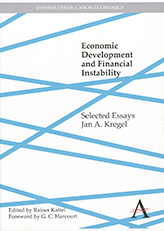
Research Topics
Publications on Financial liberalization
-
Integration, Spurious Convergence, and Financial Fragility
Working Paper No. 847 | October 2015A Post-Keynesian Interpretation of the Spanish Crisis
The Spanish crisis is generally portrayed as resulting from excessive spending by households, associated with a housing bubble and/or excessive welfare spending beyond the economic possibilities of the country. We put forward a different hypothesis. We argue that the Spanish crisis resulted, in the main, from a widening deficit position in the nonfinancial corporate sector—the most important explanatory factor behind the country’s rising external imbalance—and a declining trend in profitability under a regime of financial liberalization and loose and unregulated lending practices. This paper argues that the central cause of the crisis is related to the nonfinancial corporate sector’s increasingly fragile financial position, which originated from the financial convergence that followed adoption of the euro.
Download:Associated Programs:Author(s):Esteban Pérez Caldentey Matías Vernengo -
Economic Development and Financial Instability: Selected Essays
Book Series, October 2014 | October 2014By Jan A. Kregel. Edited by Rainer Kattel. Foreword by G. C. Harcourt.
 This volume is the first collection of essays by Jan Kregel focusing on the role of finance in development and growth, and it demonstrates the extraordinary depth and breadth of this economist’s work. Considered the “best all-round general economist alive” (Harcourt), Kregel is a senior scholar and director of the monetary policy and financial structure program at the Levy Economics Institute, and professor of development finance at Tallinn University of Technology. These essays reflect his deep understanding of the nature of money and finance and of the institutions associated with them, and of the indissoluble relationship between these institutions and the real economy—whether in developed or developing economies. Kregel has expanded Hyman Minsky’s original premise that in capitalist economies stability engenders instability, and Kregel’s key works on financial instability, its causes and effects, as well as his discussions of the global financial crisis and Great Recession, are included here.
Published by: Anthem Press
This volume is the first collection of essays by Jan Kregel focusing on the role of finance in development and growth, and it demonstrates the extraordinary depth and breadth of this economist’s work. Considered the “best all-round general economist alive” (Harcourt), Kregel is a senior scholar and director of the monetary policy and financial structure program at the Levy Economics Institute, and professor of development finance at Tallinn University of Technology. These essays reflect his deep understanding of the nature of money and finance and of the institutions associated with them, and of the indissoluble relationship between these institutions and the real economy—whether in developed or developing economies. Kregel has expanded Hyman Minsky’s original premise that in capitalist economies stability engenders instability, and Kregel’s key works on financial instability, its causes and effects, as well as his discussions of the global financial crisis and Great Recession, are included here.
Published by: Anthem Press
-
Managing Finance in Emerging Economies
Working Paper No. 630 | October 2010The Case of India
India has been experiencing rising inflows of overseas capital since the deregulation of its financial sector. Often looked upon as a success story among other emerging economies, the country has been subject to pitfalls and trilemmas that deserve attention. It has been officially recognized by the Governors of RBI that the financial crisis in India reflects the “dirty face” of what is described in the literature as the impossible trinity, along with the volatility in the markets that was caused by speculative capital in search of profits. However, Joseph Stiglitz observed that India’s policymakers, “particularly the Reserve Bank of India, are already doing a great job. I wish the US Federal Reserve displayed the same understanding of the role of regulation that the RBI has done, at least so far.” Recently, the United States made a path-breaking move with the launching of the recent bill on the regulation of Wall Street, which was passed by a majority of the Senate on May 20, 2010. We urge the implementation of similar laws in India and other emerging economies, especially in view of the fact that the recent moves for financial deregulation in these countries have, rather, been in the opposite direction.
Download:Associated Program:Author(s):
